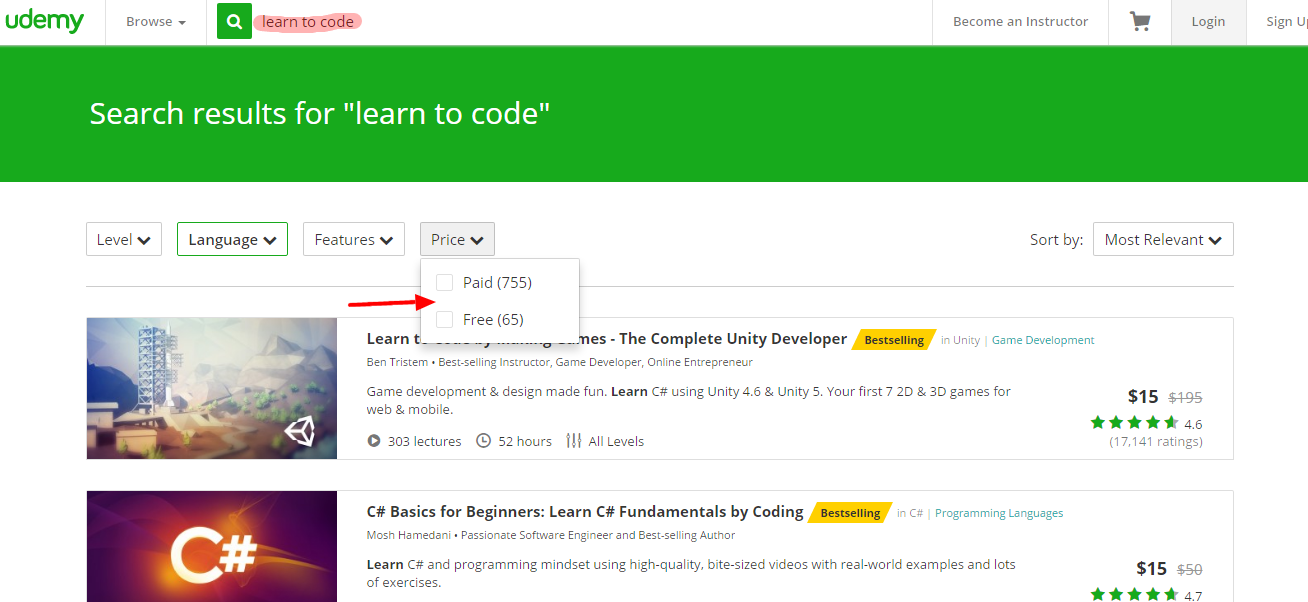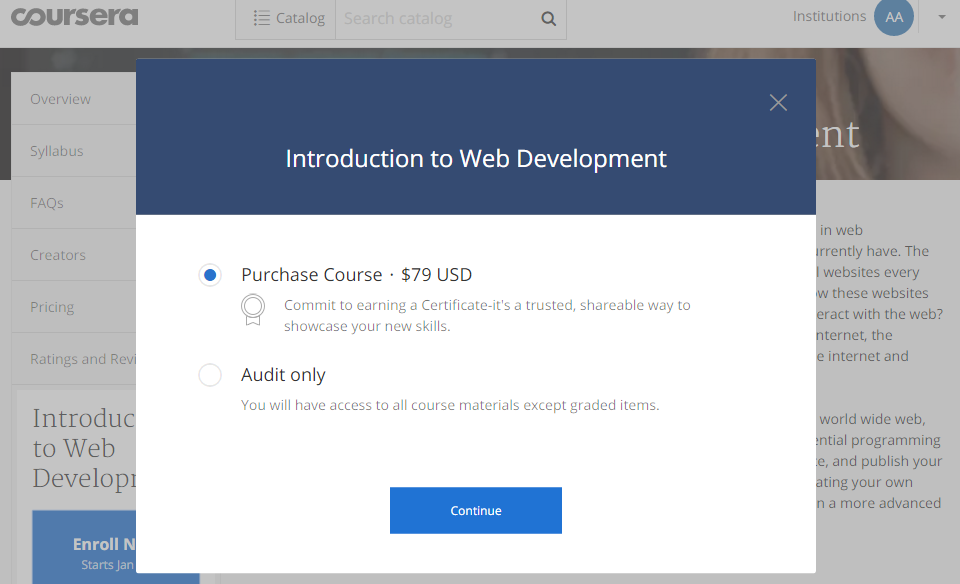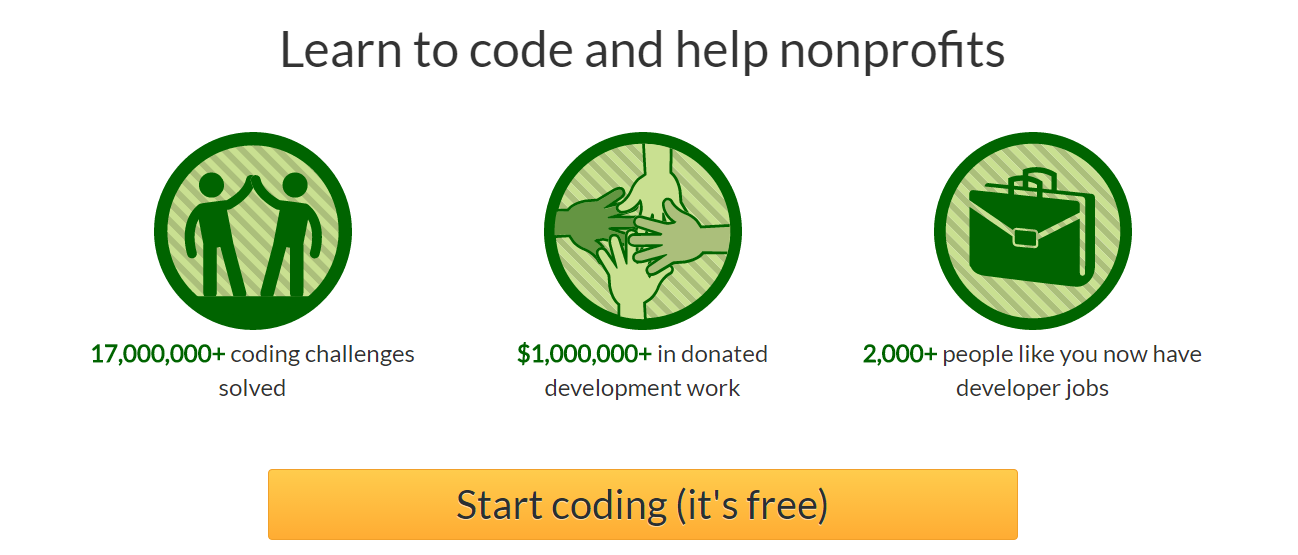 Learn to code. Seriously. I can’t stress enough how valuable coding skills are. And coding know-how can often lead to much more flexible (and lucrative!) work.
Learn to code. Seriously. I can’t stress enough how valuable coding skills are. And coding know-how can often lead to much more flexible (and lucrative!) work.
So, if you’ve been plotting an escape from your cubicle for some time, coding may very well be your ticket out of the office.
In fact, some of the most in-demand, remote-friendly positions revolve around coding. So, I’ll say it again, if you want to work from anywhere (and make a good living to boot) learn to code!
But before we jump into how and where you can learn to code, let’s look at what exactly coding is and why it’s such a hot commodity skills-wise in the remote working world.
What Exactly is Code?
All the websites, apps and software you use are built on code.
Your favorite social media site? Yep, that’s code.
That game you spend way too much time playing? That’s code, too.
Your go-to browser for searching? All code.
This very line of text you’re reading right now? You guessed it! Code.
And because so many amazing things are built upon code, it means there’s a lot of demand for people who know how to code. After all, behind every awesome app and share-worthy site, there’s the brillaint mind of a programmer (what you call someone who codes). And when you learn to code, that programmer could be you.
What Does a Programmer Do?
We know the term coding is super broad and applies to many different applications, software, and sites. And the job duties of one programmer will be just as broad, varying greatly from one to the next.
In fact, there are different types of code, called languages. Each language has a specific purpose in the world of web design and development. Typically, a programmer will specialize in a few languages.
If this is starting to make your head spin! Hang in there. I promise, it’s not as complicated as it sounds.
As a beginner, you won’t be focusing on the super complex languages that well-seasoned pros tackle. You’ll start from the beginning and work your way up. Baby steps, right?
Popular Programming Languages
Someone who builds websites will be more well-versed in certain languages than others. Just as a programmer who specializes in databases may only work with a handful of languages.
Really, the type of programming languages used depends on the nature of a job and its industry.
But, generally speaking, there are those languages which are continually in demand thanks to their popularity and frequent use in building the applications, sites, and databases we use every day.
These languages include:
Java
Have an Android smartphone or tablet? Your device’s operating system is built on Java. This popular language is also used to build games, apps, and web-based content (to name a few).
PHP
Every time you visit Facebook, you’re looking at PHP in action! WordPress sites are also built using PHP.
Python
The name sounds intimidating, but Python is actually regarded as a beginner-friendly language to learn. It’s also the power behind web apps for my favorite visual search engine, Pinterest!
Ruby
Although specifically built to be easy to write, Ruby packs quite a lot of punch. This powerful language is used to build websites and apps as well as power Ruby on Rails, the framework that brings sites like Groupon and Shopify to life.
JavaScript
All of those interactive features and animations you see on websites are there thanks to JavaScript. It’s also a popular language for game developers.
SQL
Many databases are built using the special-purpose language of SQL. It’s specifically known for its query feature that allows users to search databases.
C Language
Before there was Ruby, Python, Java (or any other languages), there was C Language. As the oldest programming language around, many of the others mentioned on this list were built with C Language as a foundation. Needless to say, it’s a must-learn for aspiring programmers!
To learn a little more about the in-demand programming languages (and to grab an awesomely free quick-start guide to becoming a web developer), head on over to Coding Dojo.
A Cubicle-Free Career
We know what code is. We know when you learn to code, you posess a super valuable skill. And we know the different coding languages and how they’re used to make the things we see, use and interact with every day.
But what makes programming such a remote-friendly career path?
Coding can be done from, well, anywhere. With a computer and Internet connection, you can work on, collaborate with, and share code with coworkers from around the world.
And many startups and well-established companies alike recognize this. So, instead of limiting their taent pool to local candidates, they open their virtual doors to anyone with the knowledge to get the job done.
So, when your end goal is to carve a cubicle-free career path, programming can definitely open up a lot of those opportunities for you.
Who Hires Programmers?
Programmers may be hired as full-time employees or as freelancers to perform one-off gigs.
For example, an online boutique owner may hire a programmer to help give their website a new look.
Or a large tech company may need a programmer on staff to make updates and troubleshoot bugs.
Really, it just depends on the company or person hiring and their needs.
Take Automattic, for example, the mastermind behind WordPress and popular plugins Jetpack and Akismet. They frequently hire full-time programmers because they have a lot of projects going on at any given time. And, as you may have guessed, their Code Wranglers and JavaScript Engineers can work from anywhere!
But a quick search on Dice, a popular tech job board, shows a good mix of full-time, part-time, and freelance projects to choose from.
So, no matter the type of employment you’re after, chances are you can find it once you learn to code!
I’m In! I Want to Learn to Code
I knew you’d say that 😉 As you might have guessed, there are a lot of places you can learn to code. Some are free and some are paid for.
Before you jump in and spend a ton of money on one programming course after the next, I suggest checking out the freebie options first. If you feel you want to invest in a paid-for program down the line, go for it! At that point, you’ll know you’re in it for the long haul.
But trust me when I say, these free options are so darn good, you may not even want to consider anything else.
Learn to Code — for Free!
Codecademy
At Codecademy, you can learn everything from HTML to Ruby on Rails. The Codecademy Course Catalog is brimming with lessons that will prepare you to tackle a number of projects. You’ll even learn to build your own website and publish it to the Internet.
Each lesson is interactive and engaging. And for good reason — Codecademy is on a mission to change the way we learn. When you start taking their courses, you’ll take notice of their efforts and see just how fun it can be to learn to code.
Codecademy is my top pick if you want to learn to code for free. This platform is perfect for budding programmers who want a step by step guide to help them reach their goals. Codecademy will even track your progress for you and create a tailormade learning path to help you reach your goals.
And if you’re ever feeling less than motivated to move on to the next lesson, you can read super inspiring Codecademy success stories to help put a little pep back into your programming step.
Udemy
Udemy is a platform that course creators use to share their knowledge with others. Many courses are a mix of video, slides, and even quizzes! There are both paid and free courses available, and there are new ones being added all the time. When searching for “learn to code” make sure you have the “free” box checked to see a current list of freebie courses!

You can see there are ten times as many paid options as free ones. If there’s one you love that isn’t free, like the highly-rated Complete Web Developer course, don’t worry. Courses on Udemy are often very affordable — costing less than $50 on average.
Keep in mind, a course is only as good as its creator. So, you may stumble upon some not-so-stellar options. Make sure to check the reviews from other students before enrolling!
Coursera
Coursera is a collection of courses from top universities. I’m talking Duke University, Stanford, and University of Pennsylvania! Impressive, right?
You can search their catalog of courses for ones that pique your interest or try your hand at some of their popular offerings in the Computer Science category.
If you enjoy learning in a traditional classroom environment, you may want to learn to code with Coursera.
Before you ‘enroll’ in a course, you’ll learn upfront what the prerequisites are, the weekly time commitment, and receive a syllabus of projects and lessons.
Remember, courses are taught by actual professors at top universities, so you’ll have to participate and finish assignments by certain dates.
Not all courses are free at Coursera. And even the free ones have a premium option. With the premium option, you’ll receive a certificate upon completion. You’ll also get graded assignments — two important features not available in the freebie option.

If your end goal is to work as a developer, seriously consider purchasing courses. The certificate will be recognized by prospective clients and employers and will make a nice addition to your resume!
But, don’t worry, if you have your heart set on a program that requires a purchase but can’t afford it, there are financial aid options available.
Free Code Camp
At Free Code Camp, you get to learn to code all while helping non-profits. But before you can put your knowledge to work for good, you’ve got to complete three Free Code Camp certifications:
- Front End Development
- Data Visualization
- Back End Development
Once you do, you’ll get to work on projects for nonprofits! This is a great way to give back all while building your portfolio.

Free Code Camp’s ultimate goal is to help you launch your flexible career as a developer. And having a portfolio filled with non-profit projects to show off will certainly help you do just that. To date, more than 2,000 people, like you, now have developer jobs thanks to Free Code Camp!
Learn to Code Today
The best way to learn to code is to jump in and get your hands dirty! Even knowing basic HTML and CSS can set you a part from your peers.
True Story: A client paid me double for web content I wrote because I included very basic formatting.
So, as soon as you start learning, that knowledge can pay off! And once you get a few projects under your belt, be sure to set up your own portfolio site to showcase your work. From there, you can take your newfound coding skills with you wherever you go — Syracuse, Starbucks, Sri Lanka — the sky’s the limit (as long as there’s internet!)
Questions? Confused? Sound off in the comments below. I’m happy to help!
This post contains affiliate links. I only recommend products, services and businesses I know and trust. Learn more about my use of affiliate links by checking out this disclosure statment.

Great list of resources as always Ashlee! I hesitated to learn about coding but now I love it and like you said, it does open a world of new opportunities. I didn’t think I’d ever become a WordPress web designer…but here I am. 🙂
Thanks for sharing. Passing this along. Have a great week hun!
Cori
Awesome post! I got started right away. I’ve made a daily stop at your blog since November.
Cori Ramos,
Before you started did you have a background in tech anything? I have no background but would love to learn a new skill. I kick myself for not going into the tech field.
Thanks
Rosalynn Wolfe
Hi Ashlee,
Thank you so much for your information on coding. I was thinking about learning coding from quite sometime now and your article convinced me to go on codecademy site today and guess what i learned basic coding of html and so excited to learn css tomorrow. Since I want to change my field from insurance to IT this is exactly what I wanted as I didnt know where to start from. Hats off for your achievement and thanks again for sharing. I hope to learn a lot of languages.
Hi Sunny,
That’s awesome! I’ve used Codecademy to learn some basic HTML and CSS that I mostly use here on the blog. I’m so glad you’ve taken the first step. You’ll find there are many, many remote opportunities as a programmer. I hope you stick with it 🙂 Best of luck!
Happily,
Ashlee
Hi Ashley,
first and foremost, I would like to thank you for sharing this most important information I have found so far on Pinterest. You definitely hit the bulls eye right in the middle on this one. I have been working with the so called “Cubicle Conformism” for 10 years now and I’m “SO BORED!!!.” I can’t tell you how refreshing it was reading this article about coding, I have heard of some of the languages that are needed to be learned but I never new that it’s was called coding and that I can make a living learning these languages. I have bookmarked Codecademy and will promptly start it tomorrow. Thank you again Ashley. 🙂
I have been looking on line for weeks. Can’t seem to find lifetime remote work. Due to a family member who is very sick, I am on their road a lot and CAN’T work a 9-5 cubicle job. I hope this works. Need an income. How long before one can start working with clients?
Pluralsight.com is also another great place for free trials and fantastic content.
Thanks, Wendy! I’ll have to add them to the list 🙂
Happily,
Ashlee
Hello
My name is Jana Barrington and I went to college and became a CPC. I tried with all my heart to find a work from home coding job but never did. I was born to run codes
I am interested In medical coding. Does this program offer this as well?
Hi Donna,
Thanks for stopping by! This is coding for web development and computer programming. If you’re interested in medical billing and coding, check out this beginner’s guide: https://workfromhomehappiness.com/medical-billing-and-coding-jobs-from-home/
Happily,
Ashlee
must a will try
..good luck to all
.
I see this post 📬 and comments are a year old. Im curious if any of the information ℹ️ listed here is still valid. Ive Ben searching for so very long to be able to make money 💰 and hopefully do that from home. If you become a programmer, is it possible to work from home 🏠? Im on disability and need to make more money 💰 without losing my benefits. Would this work for me?
Hi Ashlee Thanks for the goods lesson and your hopeful gude in all corners. have tried and its succeeding depent.
Thank you so much Ashlee 😉
I am a medical student but I always had an interest in computer gigs so I wanted to learn coding!
You make it sound so easy. It is not. I spent four years getting my degree and RHIT. No jobs for me. Even though I have worked for 9 years in all areas of the revenue cycle, no one would hire me as a coder. Don’t be fooled by empty promises. It isn’t that easy.
I warn people because I don’t want them wasting years of their lives like I did mine.
Hi is this the coding to became CPC?
I need to take it for wor I do it since 2012 but without the certification I will get moved
Hi Andrea,
I think you’re referring to Certified Professional Coder. This isn’t for that — this is for web development and coding. You would need to look into Medical Billing & Coding.
Happily,
Ashlee